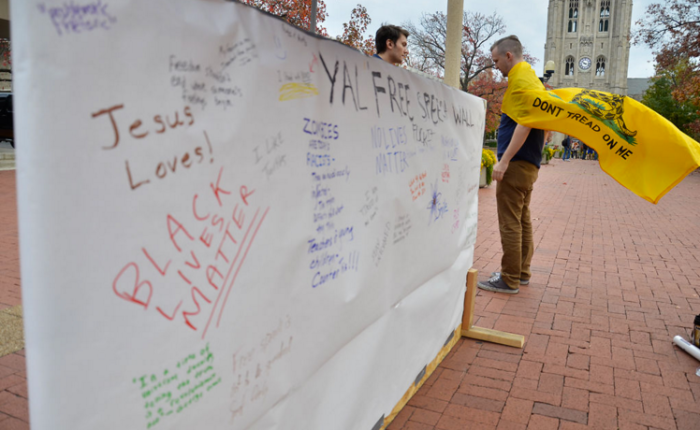The first time I raised my hand to pitch an idea in a newsroom, I began with four to five disclaimers before even getting to my actual point. It went something like this:
“Sorry, I know this is probably wrong, or someone already said it, or it’s probably stupid, and I don’t know if it makes sense, but ________.”
And then I ended it with, “That probably made no sense, sorry, I don’t know.”
Let’s analyze this for a second, because chances are, you have either heard yourself and/or others do this same self-deprecating, questioning speech many times. And you’ve probably heard it, unfortunately, from a woman.
This type of speech is common for women in professional settings. (This brilliant WashPost article, for example, rewrites famous quotes, “the way a woman would have to say them during a meeting”. ) Not only ingenious and entertaining, but also poignant and telling.
Throughout my life, whether in a classroom, at a party or in an office, men typically make their voices known more loudly, more assuredly and more often than their female counterparts. Of course that is a generalization, and I’ve met my share of confident, outspoken women and shy, uncertain men. People of all genders suffer from insecurity or are just not outspoken. And yet women have been proven to be less confident and less likely to speak up than men, especially in a professional environment.
I read this article recently on this phenomena known as “The Confidence Gap”. While I wish it had gone more in-depth about the social and psychological aspects, overall it provides an excellent analysis of the difference between the confidence levels of men and women and, more importantly, why it exists.
To summarize (even though you should definitely at least peruse that article) there are a number of aspects that may play into this discrepancy. One example begins in the schoolyard.
Firstly, girls are taught from a young age that they are rewarded for being “good girls”: quiet, neat, calm. They are rewarded for being this “perfect” child and learn to link their self worth to this praise. Boys, on the other hand, are excused by a “boys will be boys mentality”. They are expected to be rowdy, loud and messy. While generally this means that boys are scolded more often than girls, it also means that when children are criticized, girls take it more to heart. They internalize those feelings, attributing them to a problem with their deeper selves, while boys often learn to blame external factors.
This is just one example (shortened and simplified quite a bit: read the article!!) of the way in which boys and girls are socialized to see themselves a certain way and to act based on the expectations of others. Many girls, then, learn that being quiet gains approval while speaking up can lead to judgement and, even worse, mistakes. Many boys learn they are rewarded for displaying “masculine” qualities such as competitiveness, outspokenness and assertiveness. (Both sets of these expectations cause problems for all gendered people; this particular post is simply focusing on women.)
And so, after years of sociological and psychological imprinting from a society still steeped in sexism, we reach the later part of our lives when we may be entering the professional world.
Many women, even unconsciously, have a fear of speaking in front of others because they’re terrified of being wrong. For me, even if I was 99% sure I knew the answer in class, I bit my tongue. If I had been thinking of a great idea for a week, it rarely crossed my mind to actually bring it up to someone. Even in large groups outside of work or class, I would often edit everything I thought about saying before actually saying it and then, if it wasn’t perfect, kick myself for speaking up at all.
Of course, not every woman does this, and many men may experience the same problems. Additionally, part of this problem can come from anxiety and other disorders, which impacts millions of people, no matter the gender.
And yet, as I’ve said, women have been proven again and again to suffer from this intense confidence-anxiety more often than men.
This manifests itself in a number of ways. Many females, even those that meet all of society’s requirements for being “successful”(wealthy, powerful, intelligent, ect.), second-guess themselves, constantly self-critique, underestimate their abilities and downplay their own role in their successes.
When I first started thinking about this, I kind of scoffed, to be honest. I don’t do that. I thought. And just like that, I was taken back to a moment my sophomore year during my first news reporting class. My professor told me that my article, which was assigned as a project not meant for publication, was brilliant and well researched. She told me to take it to the local newspaper (the good ol’ Missourian) and look into getting it published. I remember telling a friend and hearing him exclaim how great that was and complimenting my work. I told him that there was no way I was going to turn in that story, I had just gotten lucky and stumbled on that information, and I was definitely not the most qualified person to write the story. And I really believed that. (And no, I didn’t end up publishing the story or going anywhere near the Missourian until the next year).
During my multimedia class, my professor told me I had a gift for photography. I had been told I was bad at art my entire life, and convinced myself I had just magically stumbled across good shots. When a coworker told me I was good at interviews, I laughed and said no way, I talk too much.
Even writing this, it feels like bragging, like I should throw a disclaimer in here to make sure readers don’t think I believe I really am good at all of those things. Which proves just how entrenched this low confidence attitude really is, that even when you recognize it, it’s still hard to shake.
I’ve heard so many of my female friends and coworkers say these same negative mantras about their own work. I just guessed well and got lucky. I was in the right place at the right time. I’m not really good at this, I shouldn’t be here. I don’t really know what I’m doing. I’m not as qualified as someone else. I don’t, I’m not, I can’t, I shouldn’t…
And so on and so on with this unsure, insecure, second-guessing… well, bullshit, to be frank. This isn’t modesty. This is taking all of our talents and successes and badass-ness and burying it underground beneath excuses and inaccurate attribution. This is undermining all of our hard work and natural gifts. This is taking our incredible natures and throwing it in the universe’s face. This is dooming us to never fully grasp not only how great we are, but how great we can still become.
Because it is not ridiculous at all to say every woman I’ve met has had an enormous amount of potential. I know women who are incredible doctors, artists, mothers, CEO’s, journalists, athletes, friends, teachers, photographers, writers, listeners, talkers… And I bet half of them don’t even know it. And they should.
So I have a message for them (and for myself).
It’s time to stop starting every sentence with an apology. It’s time to stop ending every thought with a disclaimer. It’s time to stop attributing every success to some external factor. It’s time to stop telling ourselves we’re not good enough or we don’t belong here. It’s time to stop second-guessing ourselves.
It’s time to shed our insecurity blanket.
It’s time to be confident.
Today was my first day at my internship at Politico in Brussels.
When I had an idea, I called over a coworker and said; “Hey, here’s my idea.” And that was it. And it was a good one.
Photocred: Katealia Lilly


